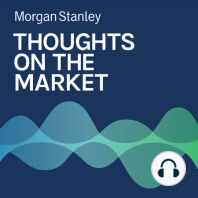3 min listen

U.S. Fixed Income: When will the Treasury Market Rally?
U.S. Fixed Income: When will the Treasury Market Rally?
ratings:
Length:
10 minutes
Released:
Jun 28, 2022
Format:
Podcast episode
Description
As the Fed continues with aggressive policy tightening, fixed income investors may be wondering if the bond market is accurately priced and when we might see it rally. Chief Cross-Asset Strategist Andrew Sheets and Director of Fixed Income Research Vishy Tirupattur discuss.-----Transcript-----Andrew Sheets: Welcome to Thoughts on the Market. I'm Andrew Sheets, Chief Cross-Asset Strategist for Morgan Stanley Research. Vishy Tirupattur: And I'm Vishy Tirupattur, Director of Fixed Income Research at Morgan Stanley. Andrew Sheets: And today on the podcast, we'll be discussing the outlook for the U.S. bond markets. It's Tuesday, June 28th, at 9 a.m. in San Francisco. Andrew Sheets: A note to our listeners, Vishy and I are recording this while we're on the road talking to clients, so if the audio quality sounds a little bit different, we hope you'll bear with us. Andrew Sheets: So Vishy, this has been a historically volatile start to the year for U.S. fixed income. We've seen some of the largest bond market losses in 40 years. Before we get into our views going forward, maybe just give a little bit of perspective about how you see this year so far, and what's been driving the market. Vishy Tirupattur: Andrew, what's been driving the market is the significant and substantial change in the monetary policy expectations, not only in the U.S. but also across most developed market economies. That means we started the year with the target Fed funds rate around close to 0%, and we have now ratcheted up quite significantly. And markets are already pricing in a further substantial increase in the Fed funds rate going forward. All this has meant that the duration sensitive parts of the bond market have taken it on the chin. Andrew Sheets: So Vishy that's interesting because we might be seeing kind of a transition in the market narrative as we head in the second half. What do you think the bond market, especially the Treasury market, is currently pricing in terms of Fed expectations? And do you think the bond market is priced for a recession? Vishy Tirupattur: I think bond market is sending some signals here. So the bond market is pricing that the Fed will continue to combat high inflation by being aggressively frontloaded in interest rate hikes. So this frontloading of the interest rate hikes means the front end of the Treasury curve perhaps has some more to go. And we expect that the end of the year, the two year Treasury will be at 4%. But on the other hand, the ten year Treasury, we expect the year at 350. That means the market is already beginning to become concerned about how growth and growth prospects for the U.S. economy will work out in the next 6 to 12 months. So by all measures we can look at the probability of a recession have significantly increased. That is what is being priced in the market at this point. Andrew Sheets: You know, I think it's safe to say that the dominant story, right, to start the year has been these upside surprises to inflation and then central banks, including the Fed, racing to catch up to those upside inflation surprises. And yet it's really interesting the way that Chair Powell and the Fed are now describing the way they're going to react to inflation is to say that we will effectively keep tightening policy as long as inflation surprises to the upside. But isn't the Fed using a tool that works with a lag?Vishy Tirupattur: That is absolutely correct Andrew. What the withdrawal of policy accommodation that the Fed is accomplishing through these frontloaded hikes is tightening of financial conditions. We have begun to see some effect of this tightening of financial conditions on the economic growth already. But in reality, the long experience suggest that these effects will be lagged anywhere between 6 to 18 months. So this is what our economists are thinking, given this frontloaded hiking path. We think the Fed will stop hiking towards the end of this year in December, and we will watch for how these tight
Released:
Jun 28, 2022
Format:
Podcast episode
Titles in the series (100)
Mike Wilson: Are U.S. Economic Indicators Flashing Yellow? by Thoughts on the Market